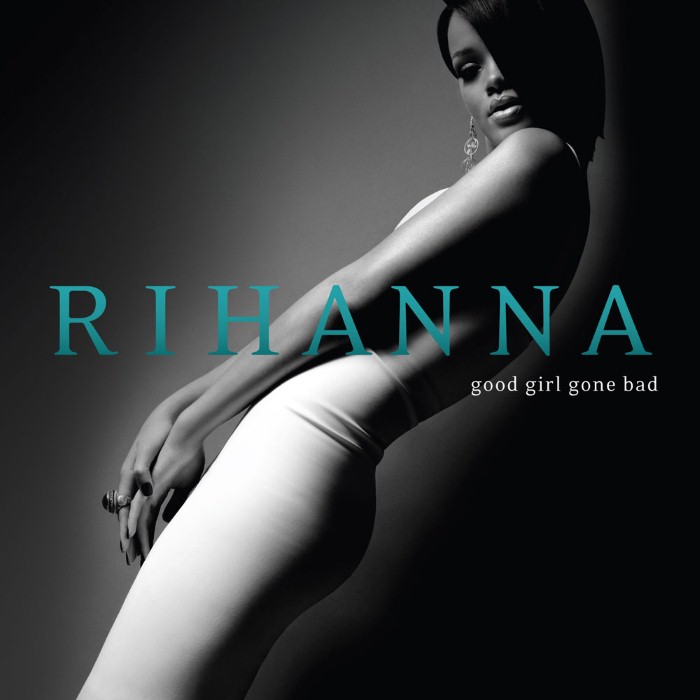Good Girl Gone Bad by Rihanna

Good Girl Gone Bad is the third studio album by Barbadian recording artist Rihanna, released on May 30, 2007, by Def Jam Recordings. The album was recorded between October 2006 and April 2007, at Westlake Recording Studios in Los Angeles. Contributions to the album's production came from a wide range of producers including Christopher "Tricky" Stewart, Evan Rogers, Carl Sturken, Ne-Yo, StarGate, and Timbaland. Its music incorporates pop and dance-pop styles with up-tempo and ballad-oriented songs, departing from the dancehall influence of her previous albums. Upon its release, Good Girl Gone Bad received generally favorable reviews from music critics. The album debuted at number two on the US Billboard 200, with first-week sales of 162,000 copies, and became a massive commercial success. The album achieved multi-platinum success in several countries. Seven official singles were released from the album. Its lead single, "Umbrella", earned Rihanna a Grammy Award for Best Rap/Sung Collaboration. The album was reissued as Good Girl Gone Bad: Reloaded in June 2008. The album was re-released titled, Good Girl Gone Bad: Reloaded, on June 2, 2008, a year after the release of the original version. Aside from the original tracks, the new edition features three new songs (listed in the order of their release as singles): "Take a Bow"; "If I Never See Your Face Again" (a duet with Maroon 5); and "Disturbia". In an official press release by Def Jam, it was announced that a song titled "Hatin' on the Club", which was written by The-Dream and produced by Tricky Stewart, was also supposed to be included. Eventually, however, for reasons unknown, it was removed from the final track listing. There is also a double-disc deluxe edition that includes a DVD.
Superstars aren’t created overnight; most are lucky to access any notoriety after dropping a single blockbuster hit. But Rihanna isn’t your average superstar. The Barbadian singer’s career, it could be argued, broke through with a solo clash of a hi-hat cymbal now recognised the world over as the first sound of “Umbrella”. The Grammy winning track opens her third LP. With some assist from JAY-Z, Ri’s delivery of “brella-ella-ella-eh-eh-eh” was the sound heard around the world, the start of her own personal revolution: a departure from her “Pon de Replay” Caribbean pop (after all, “Umbrella” was originally written for Britney Spears, whose team turned it down) and an arrival at total ubiquity. His is the first voice we hear, but her voice is the one we remember. It sets the tone for her third album, a confluence of ambitious, boundary-pushing vocal work on Rihanna’s part—a pivot toward edgy songcraft targeting the global stage—and a laundry list of A-list producers: Tricky Stewart, Sean Garrett, The-Dream and Timbaland. They, armed with the skill set to evolve Ri’s voice, worked to maintain her dancehall roots (like in “Say It”, which samples Mad Cobra’s 1992 song “Flex”), laying the foundation for an ineffable career. <i>Good Girl Gone Bad</i> has it all, boasting a prescient genre-agnosticism decades ahead of the pop landscape. “Shut Up and Drive” is high-octane New Wave rock ’n’ roll, for example, though the record is largely classified as pop R&B, while “Disturbia” charms with its gothic disco. There’s also a deep understanding of the importance of worldwide dance-pop hits, particularly with “Don’t Stop the Music”, courtesy of Norwegian producers Stargate, and its clever sample of Michael Jackson’s “mama-say, mama-sa, ma-ma-koosa" from his 1983 single “Wanna Be Startin’ Somethin’”. The record isn’t stacked exclusively with timeless classics—the pursuit of perfection is a fool’s errand—but even the non-blockbuster tracks stand out as exemplars of their time. Looking for a smooth-like-butter acoustic R&B ballad challenging Beyoncé’s “Irreplaceable”? It’s “Hate That I Love You” featuring Ne-Yo. Or maybe it’s spacey, existential R&B with an ’80s-inspired spoken-word interlude you’re after? Look no further than “Question Existing”. Or do you prefer late-2000s sounds to be stacked with orchestral instruments and melancholic metaphor? That’s all “Rehab”, co-written by Justin Timberlake and produced by Timbaland. <i>Good Girl Gone Bad</i> remains the opening note for all the culture-shifting music Rihanna would create in the years that followed—as well as the legacies she’d inspire.
